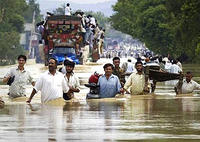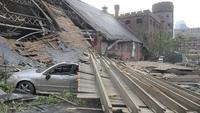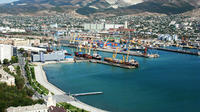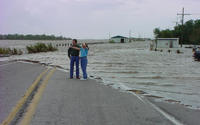-
Firefighters struggling with Arizona's second largest wildfire in history

Firefighters in eastern Arizona are struggling to contain the second largest wildfire in the state’s history; as the blaze burns toward New Mexico, Arizona officials have been forced to evacuate mountain resort communities and close national forests and parks; the wildfire has been burning steadily since 29 May; the conflagration now covers more than 311,000 acres in the White Mountains of eastern Arizona, and is threatening to damage power lines carrying electricity to Tucson; the fire is growing at a rate of four to five miles a day and protracted drought and dry, high winds have hampered efforts to control the blaze
-
-
Torrential rains hit Haiti, killing 23
Haiti has never recovered from the massive earthquake that hit it more than two years ago; the country lacks basic infrastructure, and torrential rains turned streets into rivers and buried buildings under mountains of mud
-
-
Anytime, anywhere communications across all devices enhances collaboration

Connecticut-based company offers anytime, anywhere communications across all types of devices — allowing public safety, emergency response, and select critical infrastructure entities to communicate and collaborate in the event of an emergency; the system may also be used by the military — in the field thousands of miles away — to alert, and provide information to in real time, domestic emergency agencies
-
-
St. Louis hit by earthquake, heat wave, and cicadas
For residents of Missouri still struggling to resume their daily lives after a deadly tornado killed 141 people and destroyed hundreds of thousands of dollars in property, the Federal Emergency Management Agency (FEMA) has reopened its Disaster Recovery Center in St. Louis county; working in conjunction with the Small Business Administration (SBA), FEMA will provide assist business owners and residents affected by the tornadoes by providing low interest loans for repairs to damaged or destroyed property; beleaguered residents suffered another blow on Tuesday as a small earthquake struck just outside of St. Louis; the earthquake was relatively minor and resulted in no deaths or injuries; the quake had a magnitude of 4.2 and its epicenter was located fifty miles southwest of St. Louis; the city is struggling to stay cool amidst record heat as they rebuild; on Monday temperatures soared to a record ninety-seven degrees
-
-
42 million displaced by natural disasters in 2010

In 2010 approximately forty-two million people were displaced from their homes due to natural disasters, more than double the number of people forced to relocate in 2009; the latest numbers were calculated by the Internal Displacement Monitoring Centre (IDMC), which found that more than 90 percent of disaster displacements were the result of weather-related events; the number of natural disasters has doubled from roughly 200 to over 400 a year during the last twenty years; the report found that countries on all continents were affected by the increase in natural disasters, but Asian countries have been hit the hardest
-
-
Connecticut addresses children's needs in disasters
Lawmakers in Connecticut recently passed legislation to help ensure the safety of children during a natural disaster or terrorist attack; on Tuesday, Connecticut’s House of Representatives approved a bill that would require the state to include the well-being of children in its emergency response plans; the bill passed 125 to 1 on Tuesday; under the law, the Commissioner of Emergency Management and Homeland Security is required to file annual reports that address the health needs of children during a biological attack or other incidents; the bill is currently on its way to Governor Dannel P. Malloy who is expected to sign it into law
-
-
Disasters a boon to junk removal business
Damaging weather — tornadoes, floods, hurricanes — can be a boon for the junk removal business; the past two years have seen a sharp uptick in the number of natural disasters hitting populated areas; just this spring we have witnessed the deadliest tornado season in almost sixty years; floods have wiped out homes and lives in Mississippi, Vermont, and Manitoba; Australia recovered from massive flooding in Brisbane only to be hit with an earthquake in nearby Christchurch, New Zealand; one junk removal company sees a significant uptick in revenues
-
-
Iran pushes ahead with nuke plans, despite seismic warnings
Iranian officials have chosen to ignore the warnings of top scientists and continue with the construction of nuclear facilities near earthquake prone regions; according to an official with the International Atomic Energy Agency, in a top level meeting Iran’s leaders recently decided to move ahead with plans to construct nuclear facilities, despite Iranian scientists’ warnings that “data collected since the year 2000 shows the incontrovertible risks of establishing nuclear sites in the proximity of fault lines’ in Khuzestan as well as nineteen other Iranian provinces; Iran is one of the most seismically active countries in the world with major fault lines covering at least 90 percent of it
-
-
Climate change and cities: a wake-up call

More than half the world’s population live in cities, many of which are increasingly vulnerable to the impacts of climate change; cities, however, are also emerging as the innovative “first responders” in dealing with climate change; climate change will stress cities in many ways — there will be more heat waves, threatening the health of the elderly and infirm; droughts will also become more commonplace in many cities, while in coastal communities too much water may be the problem, due to sea-level rise and more extreme coastal flooding
-
-
Deadly tornado kills four in Massachusetts

On Wednesday, as many as seven tornadoes tore through Massachusetts resulting in the state’s first twister related deaths in sixteen years; the tornadoes touched down in the western and central part of the state, but hit Springfield, located ninety miles west of Boston, the hardest; more than forty people have been admitted to hospitals after sustaining injuries from the tornado and four people have been confirmed dead so far; emergency responders are currently picking through the wreckage to rescue any survivors trapped in the rubble
-
-
Ports unprepared for increase in Katrina-like storms

A recent report by Stanford University researchers found that the majority of seaports around the world are unprepared for rising sea levels and increasingly violent storms; a majority of ports surveyed listed sea level rise and increasing extreme storms as some of their top concerns; only 6 percent of respondents said they have plans to build hurricane barriers in the next ten years, and less than 18 percent said they had plans to build dikes or other storm protection structures; to ease uncertainty among port authorities, researchers developed a computer model to provide cost estimates that take into account a port’s specific location as well as the cost of labor, materials, and equipment for fortifying a structure against rising sea levels
-
-
Envisage Technologies to provide Indiana DHS with software
On Wednesday Envisage Technologies announced that it was working with the Indiana Department of Homeland Security (IDHS) to implement the third phase of its state-wide readiness strategy; Envisage will expand its Acadis Readiness Suite, an integrated software tool that automates complex logistical tasks that normally require a host of various databases, software, and systems, to include secure certification of users; state officials say that the added software capabilities will help agencies more accurately assess resource needs and respond more quickly in emergencies
-
-
Human impact of rising oceans will extend well beyond coasts

Identifying the human impact of rising sea levels is far more complex than just looking at coastal cities on a map; rather, estimates that are based on current, static population data can greatly misrepresent the true extent — and the pronounced variability — of the human toll of climate change; a new study focuses on four regions identified as highly susceptible to flooding: the tip of the Florida peninsula, coastal South Carolina, the northern New Jersey coastline, and the greater Sacramento region of northern California; the study finds that by 2030, more than nineteen million people will be affected by rising sea levels just in their four study areas
-
-
Germany to scrap nuclear power by 2022

Germany yesterday announced plans to become the first major industrialized power to shut down all its nuclear plants in the wake of the disaster in Japan; phase-out due to be wrapped up by 2022; it means that the country will have to find the 22 percent of its electricity needs currently covered by nuclear reactors from another source; Monday decision is a U-turn for Chancellor Angela Merkel, and means that the current government has adopted the timetable for a nuclear phase-out set by the previous Social Democrat-Green coalition government a decade ago; it also cancels Merkel’s decision from November 2010 to extend the lifetime of Germany’s seventeen reactors by an average of twelve years, which would have kept them open until the mid-2030s
-
-
Scientists charged with manslaughter for not issuing earthquake alert
The 6 April 2009 earthquake which shook the Italian city of L’Aquila killed 308 of the city’s residents, injured thousands, and caused wide-spread damage to buildings and infrastructure; prosecutors have decided to bring seven geologists to trial for failing to alert city residents about the impending tremor; the geologists, all members of Italy’s Major Risk Committee, met on 31 March 2009 to discuss the possible risk to the Abruzzo region, of which L’Aquila is the capital; the region had experienced several small tremors in the months before the meeting; in a press conference following the meeting, the geologists reassured residents of the region that no major quake was imminent, and that they had no reason to leave their homes
-
More headlines
The long view
Using Drone Swarms to Fight Forest Fires
Forest fires are becoming increasingly catastrophic across the world, accelerated by climate change. Researchers are using multiple swarms of drones to tackle natural disasters like forest fires.
How Climate Change Will Affect Conflict and U.S. Military Operations
“People talk about climate change as a threat multiplier,” said Karen Sudkamp, an associate director of the Infrastructure, Immigration, and Security Operations Program within the RAND Homeland Security Research Division. “But at what point do we need to start talking about the threat multiplier actually becoming a significant threat all its own?”
